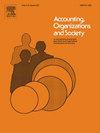How negative accounting news events, voluntary ESG assurance, and assurance provider influence consumer purchasing intentions
IF 3.6
2区 管理学
Q1 BUSINESS, FINANCE
引用次数: 0
Abstract
Consumers are increasingly conscientious of societal and environmental impacts of their purchases, prompting companies to make environmental, social, and governance (ESG) claims and engage in voluntary ESG assurance. However, prior literature lacks insight into whether consumers consider negative accounting news events (e.g., error/irregularity restatements) and their effects on purchasing intentions. Using real world consumers of sustainable goods, we investigate how varying levels of negative accounting news events (i.e., error or irregularity restatements), the presence of ESG product-quality assurance (e.g., cage free egg certification), and the type of assurance provider (e.g., an accounting firm that also audits the financial statements, an accounting firm that does not audit the financial statements, government agency) influence purchasing intentions and organizational legitimacy perceptions. We find that consumers surrogate negative accounting news events as indicators of ESG claim reliability, negatively impacting purchasing intentions, especially for more severe events (e.g., irregularity). However, ESG product-quality assurance partially mitigates these negative effects. Moreover, we find that when an error restatement occurs, the mitigating effect is less pronounced when the same firm provides both financial statement and ESG product-quality assurance compared to a governmental agency or non-financial statement auditor. Finally, when irregularities occur, though product-quality assurance partially mitigates the detrimental effects, there is no difference between assurance providers, likely because management's willingness to deceive auditors decreases the perceived reliability of assurance in general. Our results suggest boards should obtain ESG product-quality assurance and carefully select their assurance providers.
负面会计新闻事件、自愿ESG鉴证和鉴证提供者如何影响消费者购买意愿
消费者越来越关注其购买对社会和环境的影响,促使企业提出环境、社会和治理(ESG)要求,并自愿参与ESG保证。然而,先前的文献缺乏洞察消费者是否考虑负面会计新闻事件(例如,错误/违规重述)及其对购买意愿的影响。利用可持续产品的真实世界消费者,我们调查了不同程度的负面会计新闻事件(即错误或违规重述),ESG产品质量保证(例如,无笼鸡蛋认证)的存在,以及保证提供商的类型(例如,审计财务报表的会计师事务所,不审计财务报表的会计师事务所,政府机构)影响购买意愿和组织合法性认知。我们发现,消费者将负面会计新闻事件作为ESG索赔可靠性的指标,对购买意愿产生负面影响,特别是对于更严重的事件(如违规)。然而,ESG产品质量保证部分地减轻了这些负面影响。此外,我们发现,当错误重述发生时,当同一家公司同时提供财务报表和ESG产品质量保证时,与政府机构或非财务报表审计师相比,缓解效果不那么明显。最后,当违规行为发生时,虽然产品质量保证部分地减轻了有害影响,但保证提供者之间没有区别,可能是因为管理层欺骗审计员的意愿总体上降低了保证的可靠性。我们的研究结果表明,董事会应该获得ESG产品质量保证,并仔细选择保证提供者。
本文章由计算机程序翻译,如有差异,请以英文原文为准。
求助全文
约1分钟内获得全文
求助全文
来源期刊

Accounting Organizations and Society
BUSINESS, FINANCE-
CiteScore
7.80
自引率
6.40%
发文量
38
期刊介绍:
Accounting, Organizations & Society is a major international journal concerned with all aspects of the relationship between accounting and human behaviour, organizational structures and processes, and the changing social and political environment of the enterprise.
 求助内容:
求助内容: 应助结果提醒方式:
应助结果提醒方式:


